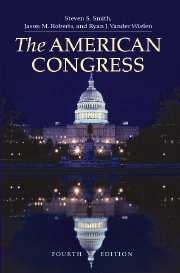Book contents
- Frontmatter
- Contents
- Preface
- 1 The American Congress: Modern Trends
- 2 Representation and Lawmaking in Congress: The Constitutional and Historical Context
- 3 Congressional Elections and Policy Alignments
- 4 The Rules of the Legislative Game
- 5 Members, Goals, Resources, and Strategies
- 6 Parties and Leaders
- 7 The Standing Committees
- 8 The Floor and Voting
- 9 Congress and the President
- 10 Congress and the Courts
- 11 Congress, Lobbyists, and Interest Groups
- 12 Congress and Budget Politics
- Notes
- Suggested Readings
- Index
- Picture Credits
3 - Congressional Elections and Policy Alignments
- Frontmatter
- Contents
- Preface
- 1 The American Congress: Modern Trends
- 2 Representation and Lawmaking in Congress: The Constitutional and Historical Context
- 3 Congressional Elections and Policy Alignments
- 4 The Rules of the Legislative Game
- 5 Members, Goals, Resources, and Strategies
- 6 Parties and Leaders
- 7 The Standing Committees
- 8 The Floor and Voting
- 9 Congress and the President
- 10 Congress and the Courts
- 11 Congress, Lobbyists, and Interest Groups
- 12 Congress and Budget Politics
- Notes
- Suggested Readings
- Index
- Picture Credits
Summary
It could have been tough to be an incumbent running for reelection to Congress in 2004. Military struggles in Iraq were constantly in the news, fears of another terrorist attack on U.S. soil persisted, the budget deficit had reached an all-time high, unemployment was at its highest level in years, and employee wages were stagnant. Opinion surveys consistently revealed that fewer than 40 percent of Americans approved of either party's job performance in Congress and majorities expressed the views that the economy and the nation as a whole were on the “wrong track.” Yet against this backdrop, more than 98 percent of House members seeking reelection were successful and, of the seven defeated House incumbents, three lost to other incumbents after redistricting in Texas forced them to square off against each other. In the Senate, of the 26 incumbents seeking reelection, only Minority Leader Tom Daschle (D-South Dakota) was unsuccessful. As this chapter demonstrates, high incumbent reelection rates are not new, but changes in redistricting and campaign finance laws have made it increasingly difficult for challengers to unseat congressional incumbents, even when large segments of the population are unhappy with the performance of Congress.
The general policy preferences of the three major institutional players – the House, the Senate, and the president – are a product of elections. Elections are selection devices. They are intended to be competitive processes in which some candidates win and others lose.
- Type
- Chapter
- Information
- The American Congress , pp. 53 - 90Publisher: Cambridge University PressPrint publication year: 2005

